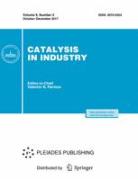Kinetics of Enzymatic Hydrolysis of Lignocellulosic Materials at Different Concentrations of Substrat
https://doi.org/10.18412/1816-0387-2015-5-60-66
Abstract
The kinetics of enzymatic hydrolysis in an acetate buffer of two substrates — lignocellulosic material from miscanthus and from oat husk (OH) — was studied at different concentrations of the substrates. The substrates were produced by a single-step treatment with a dilute solution of nitric acid. The content of a nonhydrolyzable component — acid-insoluble lignin — was 11 and 14 % for miscanthus and OH, respectively.As a catalyst, a multi-enzymatic composition of commercially available enzyme preparations Tsellolyuks-A and Bryuzaym BGX was used. It is shown that the treatment with nitric acid produces reactive substrates for enzymatic hydrolysis. Scientific novelty of the results is confirme d by Russian patent RF 2533921. The kinetics of enzymatic hydrolysis of substrates in the acetate buffer can be described by a mathematical model based on the modified Michaelis-Menten equation. On the basis of experimental data, basic kinetic constants were determined for both substrates. The equilibrium concentrations of reducing substances (RS) were calculated for substrates depending on their initial concentration. It is found that the initial rate of the enzymatic hydrolysis for the OH-derived lignocellulosic material is 1 g/(L·h) above that for the miscanthus-derived lignocellulose material in the entire range of studied substrate concentrations (33,3ч120,0 g/L). It is shown that with an increase in the initial substrate concentration from 33,3 to 120,0 g/L, the RS yield decreases 1,5–2,0-fold because of substrate inhibition. At low initial concentrations, the yields of RS for both substrates are similar. In contrast, at the high initial concentration of substrate (120,0 g/L), the yield of RS from the miscanthus-derived lignocellulosic material is about 20 % higher than that from the OH-derived material. The obtained experimental dependence and the suggested mathematical model allow one to optimize initial concentrations of the substrate for efficient enzymatic hydrolysis.
About the Authors
V.V. BudaevaRussian Federation
E.A. Skiba
Russian Federation
O.V. Baybakova
Russian Federation
E.I. Makarova
Russian Federation
S.E. Orlov
Russian Federation
A.A. Kukhlenko
Russian Federation
E.V. Udoratina
Russian Federation
T.P. Shcherbakova
Russian Federation
A.V. Kuchin
Russian Federation
G.V. Sakovich
Russian Federation
References
1. Варфоломеев С.Д., Моисеев И.И., Мясоедов Б.Ф. // Вестник Российской академии наук. 2009. Т. 79. No 7. С. 595—604.
2. Варфоломеев С.Д., Ефременко Е.Н., Крылова Л.П. // Успехи химии. 2010. Т. 79. No 6. С. 544—564.
3. Ta her zaden M. J., K a r i m i K .// BioResources, 2007. 2 (4). P. 707—738.
4. Sun Y., Chehg J. // Bioresourse Technology. 2002. No 83. Р. 1—11.
5. Третьяков В.Ф., Макарфи Ю.И., Третьяков К.В., Французова Н.А., Талышинский Р.М. // Катализ в промышленности. 2010. No 5. С. 11—32.
6. Бешкарева М.А., Третьяков В.Ф. // Вестник биотехнологии и физико-химической биологии им. Ю.А. Овчинникова. 2012. Т. 8. No 4. С. 61—62.
7. Ефременко Е.Н., Степанов Н.А., Гудков Д.А., Сенько О.В., Лозинский В.И., Варфоломеев С.Д. // Катализ в промышленности. 2013. No 1. С. 68—77.
8. Проскурина О.В., Короткова О.Г., Рожкова А.М., Матыс В.Ю., Кошелев А.В., Немашкалов В.А., Синицына О.А., Синицын А.П. // Катализ в промышленности. 2013. No 5. С. 65—73.
9. Новожилов Е.В, Аксенов А.С., Демидов М.Л., Чухчин Д.Г., Доценко Г.С., Осипов Д.О., Синицын А.П.// Катализ в промышленности. 2014. No 4. С. 74—80.
10. Hu F., Ragauskas A. // Bioenerg. Res. 2012. 5. P. 1043—1066. Doi: 10.1007/s 12155-012-9208-0.
11. Kabel M.A., Bos G., Zeevalking J., Voragen A.G., Schools H.A. // Bioresour. Technol. 2007. T. 98. P. 2034—2042.
12. Никитин Н.И. Химия древесины и целлюлозы. М.; Л.: Изд-во АН СССР, 1962. 711 с.
13. Будаева В.В., Гисматулина Ю.А., Золотухин В.Н., Сакович Г.В., Вепрев С.Г., Шумный В.К. // Ползуновский вестник. 2013. No 3. С. 162—168.
14. Limayema A., Ricke Steven C.// Progress in Energy and Combustion Science. 2012. 38. Р. 449—467.
15. Скиба Е.А., Момот Т.О., Бычин Н.В., Золотухин В.Н. // Ползуновский вестник. 2013. No 3. С. 197—202.
16. Будаева В.В., Скиба Е.А., Макарова Е.И., Золотухин В.Н., Сакович Г.В., Удоратина Е.В., Кувшинова Л.А., Щербакова Т.П., Кучин А.В. // Ползуновский вестник. 2013. No 1. С. 215—219.
17. Макарова Е.И., Будаева В.В., Золотухин В.Н., Люханова И.В., А лешина Л.А. // Ползуновский вестник. 2013. No 3. С. 188—193.
18. Оболенская А.В., Ельницкая З.П., Леонович А.А. Лабораторные работы по химии древесины и целлюлозы. М.: Экология, 1991. 320 c.
19. ГОСТ 10820—75. Целлюлоза. Метод определения массовой доли пентозанов. Издание официальное. М.: Изд-во стандартов, 1991. 8 с.
20. Будаева В.В., Макарова Е.И., Скиба Е.А., Сакович Г.В. // Катализ в промышленности. 2013. No 3. С. 60—66.
21. Фараджева Е.Д., Федоров В.А. Общая технология бродильных производств. М.: КолосС, 2002. 408 с.
22. Варфоломеев С.Д. Химическая энзимология. М.: Академия, 2005. 472 с.
23. Айвазян С.А., Енюков И.С. , Мешалкин Л.Д. Прикладная статистика: Основы моделирования и первичная обработка данных. Справочное изд. М.: Финансы и статистика, 1983. 471 с.
24. Новый справочник химика и технолога. Процессы и аппараты химических технологий. Ч. II. СПб.: НПО «Профессионал», 2006, 2007. 916 с.
25. Синицын, А.П. Биоконверсия лигноцеллюлозных материалов / А.П. Синицын, А.В. Гусаков, В.М. Черноглазов. М.: Издательство МГУ, 1995. 224 с.
26. Li Li, Wenbing Zhou, Hongwei Wu, Yun Yu, Fen Liu, Duanwei Zhu // BioResources. 2014. Vol. 9. No 3. Р. 3993—4005.
27. Иоелович М.Я. // Химия растительного сырья. 2014. No 1. 61— 6 4.
28. Ioelovich M., Morag E. // Bioresources. 2011. No 6. P. 2818—2835.
29. Ioelovich, M. Morag E. // BioResources. 2012. V. 6. No 4. P. 4672—4682.
30. Пат. 2533921 России. С 1. No 2013140699/20; заявл. 03.09.2013; опубл. 27.11.2014.
Review
For citations:
Budaeva V., Skiba E., Baybakova O., Makarova E., Orlov S., Kukhlenko A., Udoratina E., Shcherbakova T., Kuchin A., Sakovich G. Kinetics of Enzymatic Hydrolysis of Lignocellulosic Materials at Different Concentrations of Substrat. Kataliz v promyshlennosti. 2015;15(5):60-66. (In Russ.) https://doi.org/10.18412/1816-0387-2015-5-60-66
























